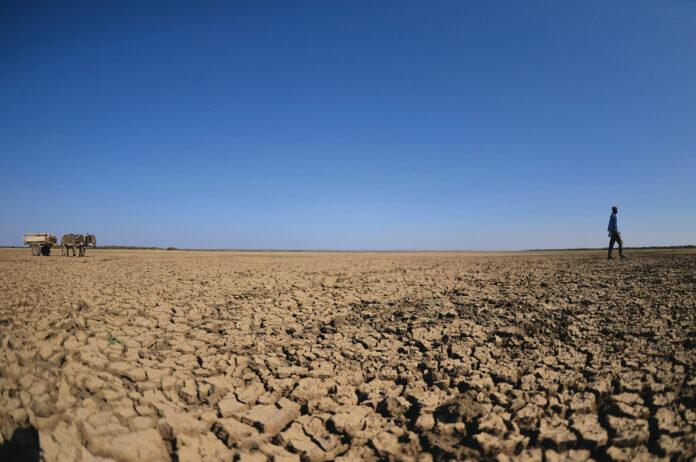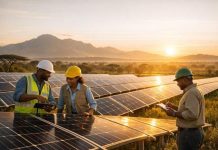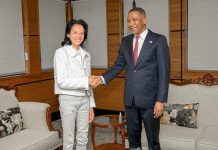Africa-Press – Botswana. An article from ‘The Conversation-academic riguar…’ posits that “Many people still think of climate change as a phenomenon that we will only face in the distant future. Perhaps that’s partly because climate change projections about rising temperatures and extreme weather events are tied to future dates: 2030, 2050, or 2100, for instance.”
The publication further highlights that over the past century, global temperatures have increased by approximately 1°C. Sea level rise is already starting to affect certain low-lying coastal communities. The world is experiencing more frequent and intense extreme climate events. The recent cyclone Ana is further testimony to this.
Climate scientists working with the United Nations persistently caution that the world is running behind time in tackling impacts of climate change.
It appears that climate change agreements like the famous Paris Agreement of 2015 were agreed upon inconsiderate of armed conflicts that might be sparked off anyhow- like the current Russia –Ukraine one. For instance, Reuters the past week reported that since Russia invaded Ukraine at the end of February, Europe has sought to cut its gas imports from Russia, which many European nations previously relied on, and is looking at other parts of the world to meet its fuel demand, including coal.
No wonder a local academic indicated that; “The anthropogenic (environmental change caused or influenced by people, either directly or indirectly) school of thought is more on the precautionary side of things. I will not be surprised if the message emanating from that is ‘scary’ or ‘alarmist’ and there is evidence to support that. Human beings as we just learnt from Covid-19 global pandemic, tend to be comfortable to be stuck in the business as usual development scenarios.
Clean energy was eloquently advocated for as the best solution to reduction of emission of Green House Gases into the atmosphere at that Paris Agreement; Also Conference of Parties (COP) 21. Developed countries, as evidently worse polluters were to aid developing ones to transit from fossil to renewable energy. A Fund- Green Climate Fund (GCF) was set up to ease the initiative. The ground was thus seemingly levelled for the initiative. Fast forward, seven years down the line developing countries are divided and fighting. On one hand is Russia, on the other NATO-comprising of Western European countries; among them France-Paris Agreement host and other members of European Union (EU).
The same Reuters quotes the president of Botswana, Mokgweetsi Masisi as having said that Botswana has been inundated with inquiries to supply coal to Europe and estimates that demand from Western countries could top a million tonnes a year.
Botswana’s climate change policy, under sub-title: ‘Botswana’s GHG emissions’; underpins that: “The main sectors in terms of GHG emissions and energy consumption are transport, mining, commercial sector, agriculture and residential sector. If any GHG emission reductions are to be instituted in Botswana, the above sectors would offer opportunities to enhance technology transfer, employment and foreign direct investment.”
Reuters further quotes Masisi as having said that Botswana has seen demand from both governments and the private sector in Europe and estimates that demand from Europe could reach more than 50,000 tonnes a month.
His Minister, Lefoko Moagi of Mineral Resources, Green Technology and Energy Security, said that Botswana could meet that demand, while Masisi said it wanted to do so “as soon as possible.”
Said Minister Moagi, “Typically 50,000 tonnes a month is what they want to get, but we’ve also had others (inquiring about) long-term contracts, (we are) looking at a million tonnes a year from individual countries (combined),”
Asked whether this move does not thwart efforts for the 2050 net zero target, Botswana’s Negotiator at the United Nations Framework Convention on Climate Change (UNFCCC) Douglas Machacha briefly responded, “If Europe is buying coal its defeating the objective of reducing coal production.
“The decarbonization is slowly being followed. There is energy crisis due to Ukraine war. If alternatives to fossil fuels is fast tracked, there would be hope. But politically it is a long one,” said Professor Julius Atlhopheng of University of Botswana.
Asked whether reports by Intergovernmental Panel on Climate Change (IPCC) and United Nations Environmental Program (UNEP) the climate change situations, he said the reports are real.
“We lack implementation-in terms of transition capacity to decarbonize; that is,what critical steps per country to deliver in Nationally Determined Contributions(NDCs). Nothing per country. Secondly, we lack human safety nets as we move away from coal; that is to ensure energy access and fight energy poverty. Thirdly the technologies may be there, but human and governance capacities are lacking. So there are few hitches, despite the science,” said the former Negotiator at UNFCCC.
A recent report by a Consultancy firm-McKingsley outlined six characteristics to green economy. One of them was regarding developing countries and fossil fuel rich regions which were highlighted as more exposed to the net zero transition compared to other geographies. The report indicated that trillion US Dollars are to be used to transit to green economy.
For More News And Analysis About Botswana Follow Africa-Press






